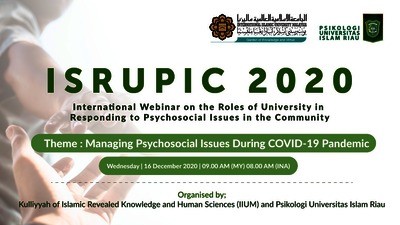Mohd Nor, Nur Suriya (2020) Approaches in dealing with the impact of COVID 19 pandemic: Islamic and Buddhist perspectives. In: The International Seminar (Webinar) on the Roles of the Universities in Responding to Psychosocial Issues in the Community 2020 (ISRUPIC 2020), 16 December 2020, Kuala Lumpur. (Unpublished)
|
PDF (slides)
- Presentation
Restricted to Repository staff only Download (721kB) | Request a copy |
||
|
PDF
- Supplemental Material
Download (218kB) | Preview |
|
|
PDF (certificate)
- Supplemental Material
Restricted to Repository staff only Download (214kB) | Request a copy |
||
![[img]](http://irep.iium.edu.my/86042/16.hassmallThumbnailVersion/IMG-20201215-WA0009.jpg)
|
PDF
- Supplemental Material
Download (122kB) | Preview |
|
|
PDF
- Supplemental Material
Download (175kB) | Preview |
Abstract
Background: The COVID-19 pandemic has led to a dramatic loss of human life worldwide and presents unexpected challenges to people’s livelihood, their health, and their social lives. This pandemic has affected day to day life of thousands of peoples, who are either sick or are being killed due to the spread of this disease. Presently the impacts of COVID-19 in daily life are extensive including healthcare, economic, and social. A study on the Psychological Distress and Coronavirus Fears in the US shows that the COVID-19 pandemic is associated with high levels of psychological distress. Psychological distress is one element of overall mental health status that could be influenced by the pandemic. Other mental health conditions such as depression, anxiety, and grief could also be affected by the pandemic. In dealing with the impacts of the pandemic, both Islam and Buddhism promote several approaches such as acknowledging the fear, understanding our interconnection, accepting grief, and meditation. Aims: 1- To highlight the Islamic and Buddhist approaches to deal with the COVID-19 pandemic. 2- To explore on how the Islamic and Buddhist approaches help people affected by COVID-19 pandemic especially on how to deal with the impacts of the pandemic in their day to day life including the prevention from different psychiatric disorders. Method (s): Library Research. Result: There are several approaches to deal with COVID-19 pandemic from both Islamic and Buddhist perspectives such as acknowledging the fear, understanding our interconnection, accepting grief, and meditation. Conclusion: The religious approaches are able to help people affected by COVID-19 pandemic especially on how to deal with the impacts of the pandemic in their day to day life including the prevention from different psychiatric disorders.
| Item Type: | Proceeding Paper (Slide Presentation) |
|---|---|
| Additional Information: | Webinar |
| Uncontrolled Keywords: | Islamic Perspective, Buddhist Perspective, Approaches, Covid-19 pandemic, Psychological distress |
| Subjects: | B Philosophy. Psychology. Religion > BP Islam. Bahaism. Theosophy, etc > BP1 Islam B Philosophy. Psychology. Religion > BP Islam. Bahaism. Theosophy, etc > BP1 Islam > BP174 The Practice of Islam B Philosophy. Psychology. Religion > BQ Buddhism |
| Kulliyyahs/Centres/Divisions/Institutes (Can select more than one option. Press CONTROL button): | Kulliyyah of Islamic Revealed Knowledge and Human Sciences > Department of Usul al-Din and Comparative Religion Kulliyyah of Islamic Revealed Knowledge and Human Sciences |
| Depositing User: | Dr Nur Suriya Mohd Nor |
| Date Deposited: | 29 Jan 2021 14:27 |
| Last Modified: | 29 Jan 2021 14:27 |
| URI: | http://irep.iium.edu.my/id/eprint/86042 |
Actions (login required)
 |
View Item |


 Download Statistics
Download Statistics Download Statistics
Download Statistics